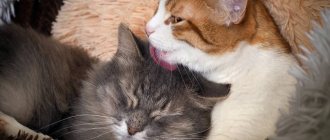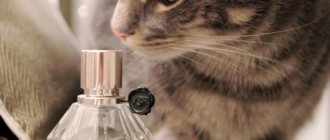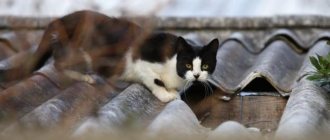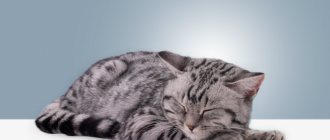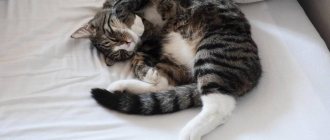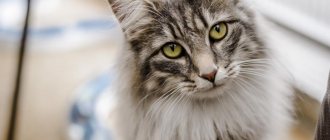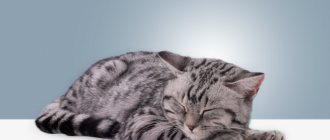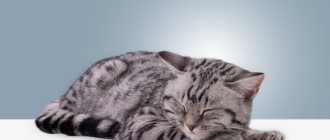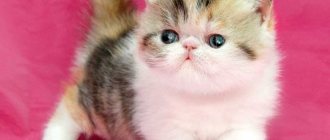Why are cats attracted to specific smells?
Attentive owners of furry pets may have noticed that cats show special interest in smells that are unusual, in human opinion. For example, cats love the smell of dirty clothes, unwashed socks or sweaty armpits. Thus, some kittens and adult pets like to sleep on unwashed linen, put their muzzles in shoes or enjoy “poking” into the armpits, while preferring more male ones. What causes this behavior, why do cats lick their armpits?
First of all, don’t be scared and think that your pet has gone crazy. The thing is that representatives of the cat family have a much better developed sense of smell than humans. Cats can detect odors and aromas that are not sensitive to our noses and at the same time feel them much more strongly.
Through new scents, cats navigate in space and adapt to environmental conditions.
Smells can attract or, conversely, repel cats. For example, cats simply adore human sweat. Animals like the smell of their owner's clothes and shoes. It is worth noting that such “scents” attract more adult cats than kittens. Babies show less interest in strong aromas and use their owner's clothes or socks as new toys.
Pheromones
Continuing the theme of the special predilection of cats for the armpits of the owner, we can say that pheromones are to blame. Especially if furry girls are in heat. They simply begin to “live” with their nose hidden in the armpits of the owner. After all, the owner’s smell becomes simply incredibly pleasant.
A cat's sense of smell is much more sensitive. And therefore, the cat family is able to distinguish not only pheromones, but even such subtleties as the hormonal background of the owner. In this case, pregnant women get active sniffing. Sometimes, based on the behavior of animals, hormonal disorders of the host’s body begin to be suspected. There is even a theory that cats can tell by their behavior when girls are ovulating. But, since animals do not write dissertations, there is no 100% evidence yet.
What else is attractive about sweat for cats?
- It's all about pheromones (ancient Greek . - I carry + . - I excite, encourage). Pheromones are chemical compounds of natural origin that play almost the main role in the interaction of animals of the same species. The power of pheromones over our smaller brothers is powerful, since they are responsible for reactions that ensure the survival of the species: reproduction, caring for offspring, etc. In particular, only pheromones allow the males and females of all animals that reproduce sexually to identify each other and mate.
- Salty sweat . Cats are partial to salty foods, and sweat, as you know, is an aqueous solution of salts and organic substances secreted by sweat glands. Sweat plays a significant role in the socio-biological processes of information transfer between mammals. In addition to pheromones, a large number of biologically active substances are also transferred with sweat. By the way, human sweat emits a specific smell. It can be both unpleasant and magnetic, depending on the gender of the subject and his readiness to mate. However, fresh sweat has no odor. It begins to be felt after some time, when bacteria activate reproduction on the skin.
- New range of scents . As soon as the owner enters the house, the cat begins to explore his feet and shoes. After all, they contain so much information from the places he visited! These are unknown and endlessly entertaining smells, especially for those cats for whom access to the street is prohibited. They rub, as if securing their rights to objects, enveloping them with their smell. Cats learn and remember smell thanks to scent glands located on their faces.
- “Tame” the smell . The lucky ones who can freely walk in the fresh air on their own, when returning home, try to replace the foreign smell with their own, family, or rather the owner’s, and that’s why they rub against people’s things.
However, this does not apply to all cats. One fourth of the cat family is completely indifferent to the smell of human sweat, valerian or catnip. Maybe because their sense of smell is less developed? Smells also do not affect small kittens. A new scent is another reason for them to have fun.
Protection
Most often, a cat comes into our home when he is very young and, naturally, experiences stress. Everything around seems new and scary. And among all this, the owner becomes his reliable support, protection, and breadwinner. Naturally, the animal gets used to associating your smell with positive experiences of calm. At the same time, falling to the most fragrant places. Where is the maximum concentration? That's right, in the area of the sweat glands. Moreover, the cleaner our natural smell is and the less it is mixed with chemicals, detergents and deodorants, the more pleasant it is for the cat. This explains not just why cats love sweat, but why they are especially crazy about what we consider to be the most foul-smelling things. The smell of your sweat is the sweetest scent of all life. By the way, this is why male sweat, as containing its own notes of a strong male, will be preferable for mustachioed pets. And cats are special fans of sweat. In addition, a pregnant cat generally does not like to be bored alone and is happy when you return home.
By the way, very young children who are forced to be separated from their mothers often fall asleep peacefully when their mother’s clothes are placed in their crib. In fact, the brains of a baby and a cat still function in the same way in terms of smells. They both do not understand social norms and do not know that the smell of sweat and body for us now is something from the “not very” category. For them, these are the natural smells of a loved one.
Causes of odor
Human sweat glands are divided into two types: apocrine and eccrine. With any increase in body temperature, the eccrine glands begin to work intensively, trying to normalize the temperature in order to prevent the body from overheating. When these glands operate, a substance consisting of water and various salts is released. Eccrine glands are located virtually throughout the body and have access to the surface of the skin.
The largest concentration of these glands is on the palms and soles of a person’s feet. Apocrine glands are associated with the hair of the body, therefore they are located mostly in the armpits and in the genital area. When working, these glands secrete a cloudy liquid that is odorless until it encounters bacteria on the skin surface.
Apocrine glands come into play during puberty, as well as during psychological stress in the body.
If you carefully monitor your personal hygiene, use deodorizing products, but at the same time you still have an unpleasant body odor, sweating has increased significantly, even without any active actions, you should not delay a visit to a specialist, as this may be a sign of a serious illness .
The sense of smell is the main organ
Animals, unlike people, don’t just smell – they read it. The sense of smell for cats is known to be extremely important. Thanks to this organ, cats find a partner for mating, hunt, and receive information. It is also an organ of communication. The main task of the sense of smell is to notify the cat for a lightning-fast reaction: with its help, she finds out what the smell carries - a threat or unpleasant sensations or, conversely, pleasure. Thanks to smells, animals navigate the environment, delimit territory, etc. Traces of memory about various aromas are never erased or dulled in the cat’s brain, but are forever fixed in the center of long-term memory, as if in a bank of smells.
Cats' reactions to strong odors
It is enough to observe how pets react to other smells. How they begin to snort when they smell onions, citrus fruits, and garlic. Animals do not like the strong smell of perfume.
They strive to escape from an unpleasant source. Most people cannot stand the smell of bleach, although the human sense of smell is much weaker than a cat's.
Predatory instinct of cats
Cats, like their larger relatives, are predators. They can sit in ambush for a long time, hiding and waiting for the right moment to attack. To do this, they certainly need to mask their smell and merge with the numerous aromas of the environment. In this case, household items that smell strongly of sweat are ideal.
Cats do not regard sweat as a sign of uncleanliness. For them, this is the natural smell of a living creature.
Signs of bleach poisoning in a cat
Of course, no owner will watch his pet eat a substance with chlorine. But a cat can easily taste a poisonous drug on the sly when no one is around. An owner whose cat likes the smell of bleach should know what the symptoms [4] of poisoning with this substance are:
- Vomiting and complete refusal to eat;
- Convulsions;
- Sore throat and spasm of the vocal cords (the cat meows hoarsely and strangled);
- There may be bleeding ulcers in the mouth (on the tongue, cheeks, palate and gums) if the cat has ingested bleach;
- Increased salivation, the fur on the neck is all wet;
- Severe abdominal pain (the cat sits in a hunched position);
- White foam from the mouth;
- Discoloration of fur if the cat has ingested chlorine bleach;
- A cat has a specific smell if its fur has been stained with bleach;
- The animal may have difficulty breathing, severe coughing and suffocation if inhaling chlorine fumes;
- Tearing, burning and redness of the mucous membranes of the eyes, deterioration of vision up to complete blindness if bleach gets into the cat’s eyes;
- Clear nasal discharge;
- When poisoned with chlorine, animals behave unusually. Some cats become extremely restless, while others become apathetic;
- In case of severe poisoning, loss of consciousness is possible.
How to keep your pet safe
Unfortunately, you can't just force your pet to give up his love of bleach. If a cat licks bleach or loves to spend time in a room where it has recently been disinfected using this chemical, the owner will have to be constantly on alert so that nothing bad happens. Here are some methods that can protect a pet that loves chlorine:
- All products containing chlorine should be stored in places where the cat has no access. For example, in drawers with doors that can be locked with a key;
- After cleaning with chlorine, it is better to finally wipe all surfaces with a cloth soaked in clean water;
- The room where you just washed the floor with bleach needs to be ventilated very thoroughly;
- While cleaning a room with bleach, it is best to lock the cat in another room;
- At home, you should not use highly concentrated professional chlorine-containing products unless absolutely necessary. Even ordinary household bleach with a low chlorine content is best diluted 1:1 with water to reduce the risk of poisoning your pet;
- Some housewives, in the old fashioned way, soak their laundry in water with the addition of chlorine bleach in basins. Doing this is dangerous if there is a cat in the house. An animal may happily drink such poisonous water;
- Perhaps the owner of a cat who loves the smell of bleach should think about buying products that do not contain this toxic chemical. The same oxygen bleaches, for example, instead of aggressive chlorine, contain hydrogen peroxide, to which animals are indifferent.
What to do if your cat is poisoned by bleach
A pet who has ingested bleach should be given as much fluid as possible (in addition to water, milk can be given). This way you can quickly remove toxins from the body. But you cannot induce vomiting in an animal without the consent of a veterinarian.
You need to open the windows to let fresh air into the room. If your pet's eyes get in contact with chlorine, they should be rinsed with plenty of running water. In addition, it is necessary to wash off the product from the animal’s skin with water, and also rinse the mouth with water. And then it is urgently necessary to deliver the injured poor fellow to the veterinary clinic
. Without timely veterinary care, death cannot be ruled out.
How to stop a cat from licking armpits
While there is nothing wrong with this, this behavior is undeniably creepy. Your cat will look poorly groomed if a guest or friend sees her licking your armpits.
And if you remove your cat from your armpits, but she still insists, there are several ways to stop insisting.
Any time you feel your cat approaching your armpits to lick them, or has already started licking your armpits, consider doing the following:
- Don't let your pet lick your armpits before he starts doing so. This way he will know that you don't like doing it and will get used to not doing it again and again.
- Start playing with your pet when you feel like he is about to lick your armpits.
- You can distract your pet with a toy to do something your pet likes. This will work when your pet is already licking your armpits. Distraction is the best way to keep your cat from doing this.
- Using a citrus-scented deodorant may cause your cat to stop licking your armpits because cats don't like the taste or smell of citrus.
True love
The more we work, the more we worry or get sick, the more we sweat. In fact, strong-smelling clothes convey the message that today has been a rough day. Therefore, there is also a theory that a cat rubs against a sweaty owner, trying to normalize the body’s activity. And he licks the most sweaty places - the armpits.
Thus, the pet tries to calm the person, bring him to his senses, and give him a charge of love. After all, you must agree, what a great happiness it is when someone loves you when you are sick and very tired, and she only loves you when you are beautiful and well-groomed.
Main reasons
Cats are one of the most independent and self-sufficient pets you can keep at home. Some people periodically feel like they are the ones living with their animal, and not the other way around, they behave so proudly. Therefore, when pets start licking their hands, many people want to think that this is only because of strong love and affection. However, this is not entirely true; there are also other reasons for this.
This behavior is one of the main reasons for licking the head, hands, face, and hair of its owner. A cat avoids people who, for one reason or another, are unpleasant to them. This could be a smell, a neglectful or rude attitude towards an animal, and many others. Therefore, if a pet shows sympathy in this way, there is no need to scold or drive him away.
After birth, when kittens are still blind and deaf, they communicate with their mother through tactile interactions. Cats lick their offspring many times a day. This moment remains in the memory of animals for life. When they reach puberty, but do not have kittens for one reason or another, they thus demonstrate maternal instinct.
Cats begin to lick their owner, thereby replacing the care of kittens. This seems funny and cute, but this behavior should alert the owner; it can harm the health of the pet. In this connection, veterinarians recommend sterilizing animals at the age of less than 12 months, if matings are not planned in the future.
Lack of attention
When the owner does not give his pet enough attention, this is fraught with damage to furniture, torn wallpaper and loss of mutual understanding with each other. Particularly active individuals can even bite a person. There are several signs that your cat wants affection or play that should not be ignored:
- flattens ears;
- nuzzles hand;
- licks the owner's nose and face.
The pet can lie flat on the floor at the owner’s feet and turn one side or another, as if showing an area of the body where it needs to be stroked or scratched.
Many cats enjoy having their foreheads and ears scratched. Moreover, the fur on the forehead should be stroked against growth, and the ears can be pulled a little. Some pets love it if their belly is touched, others cannot stand it. During molting, animals love to be combed, which is also worth taking into account.
You can start stroking without waiting for a call from your pet, but take the initiative yourself. To do this, you need to bring your hand to a distance of about 10 cm from the animal and scratch it nearby; if it reaches out and begins to rub against the owner, then the call for affection has been accepted.
Cat dominance
When licking, sometimes a cat shows its dominant role in the family. In this way she means that this person is her property. At the same time, the pet leaves its scent on the owner. If there are no signs of aggression, there is no need to fight this, as this is normal, because it is not for nothing that everyone knows that a cat is one of the most independent pets.
Anxiety and stress
With increased anxiety and stress, a cat often begins to lick itself and its owner. If such behavior has not been noticed before, or if it was much less so, you need to show the animal to a veterinarian, because this is a symptom indicating the presence of some pathology.
Another reason for this behavior is the animal’s low self-esteem. Licking the owner is a way to win him over and keep him safe. At the same time, the pet is tense and will constantly expect a trick, rather than enjoy communicating with the owner.
Boredom
Some animals, often and for a long time being alone, try to have fun on their own. Some start eating a lot, while others start licking. This is a way to cope with boredom. First, they constantly carry out the washing procedure, and then switch to the owner’s things, as well as hair, hands, face, and the person himself.
Cats have a very highly developed sense of smell, so they can lick the hands, feet, and armpits of their owners who come in the evening after work. The fact is that the smell of sweat formed on the human body during the day is a bait for animals. And by licking it, pets try to protect their owner from persecution by other animals and encroachment on their territory.
Smells that repel cats, what smell cats can’t stand, why cats love the smell of sweat
A cat has about 200 million olfactory receptors, so smell is the main way to study the world around it. The cat is comfortable in a place where all the smells are pleasant and familiar to her.
Therefore, marking a home with its own smell is a completely natural process (the rubbing of a cat’s cheeks on a chair can also be considered marking, and not just the excretion of urine).
It will not be possible to wean a cat from this by scolding, beating, or intimidation.
Felines can learn almost all the information about another animal by smell: gender, status, age, sexual availability. In this case, the reaction may depend on both the gender of the pet and its age, for example, cats react to valerian more often than cats, and small kittens are absolutely indifferent to it.
Individual odor intolerance in cats
All odors are conventionally divided into those:
- attract an animal;
- scare him away.
But there is also the concept of individual odor intolerance. Surely every owner has noticed an atypical reaction of their pet to certain odors. By observing your cat's behavior, you can easily identify them. This will help in education. But it is worth remembering that the smell used should not harm either the cat or the person.
Features of using odors to correct cat behavior
Smells do an excellent job of correcting behavior, but only if it is not associated with diseases (for example, a cat may not go to the litter box due to urinary incontinence).
Most often, an animal ignores a tray or scratching post for only one reason - it doesn’t like something.
Smells that attract will help you “love” this or that object, and those that repel you will push you away from places where you don’t want your cat to appear.
Thanks to this you can:
- stop your cat from shitting in undesirable places (first you need to use cleaning products to remove the smell of urine, and then treat the area with a repellent odor);
- prevent damage to furniture and wallpaper;
- protect plants from being eaten.
You shouldn’t repeat the treatment often, because it’s only for the human nose that odors quickly dissipate, but the cat can feel them for a long time.
In addition to using products with unpleasant odors for cats, you need to eliminate the root cause of this behavior, otherwise nothing will help and the problem will return.
Special repellents for cats
Specialized pet stores and veterinary pharmacies sell many products that eliminate cat odor and, at the same time, wean cats from sharpening their claws, marking and crapping in the apartment.
There are a lot of such drugs, reviews about them are also mixed. In any case, each cat needs a different approach, since animals have different preferences.
For one furry the smell may be neutral, but for another animal the same aroma will cause disgust or a feeling of fear.
Photo gallery: drugs that regulate the behavior of cats in the house
Some of the drugs can be used to remove stains, not just those left by animals. Each of the products has its own unique formula for affecting furry pets.
Most liquids simply remove the smell of urine, enzymes and animal feces. This may be enough for the animal to forget this place over time.
To enhance the effect, some sprays additionally contain unpleasant scents for cats.
Table: basic information about means regulating the behavior of cats in the house
| Name | Short description | How to use | Price |
| Enzyme preparation Himola Antigadin | The spray will wean your furry baby from relieving himself where he shouldn’t. It begins to act within an hour and a half after application. Until this time, the animal should not be allowed into the area. Effective for kittens of both sexes who are 2 months old or older. Neutral effect on treated surfaces. | Wash with water those places that are soiled by the animal, after removing the feces. Do not use detergents or disinfectants. Spray the composition onto the surface to be treated from a distance of 20 to 40 cm. | Around 100 rubles |
| Beaphar Stop-it Cat Spray to Repel Cats | Effectively wean furry pets from relieving themselves in places not intended for cat litter. Contains methyl nonyl ketone. | Remove cat waste products. Spray this area with a spray from a distance of 30 cm. Repeat the treatment every day until all traces disappear. | 650–700 rubles |
| 8 in 1 - Natures Miracle | The liquid product is designed to neutralize persistent odors and also removes stains caused by pet waste. Can be used on carpets, hard and fabric surfaces. Removes all dirt left by cat marks, urine and feces, including sticky residue. To achieve maximum effect, you need to wait until Natures Miracle dries naturally. This may take up to two weeks. But during this time it will be able to penetrate the entire depth of contamination, including the lining of the carpet and the upholstery of upholstered furniture. | Apply the liquid to the surface in an inconspicuous place, wait a while, then wipe it off with a cloth. If the color has not changed, the drug can be used. Wipe the stain, then apply Natuers Miracle. Wait a few minutes and wipe the surface. Animals should not be allowed near this area until it is completely dry. Difficult stains should be removed with a brush with stiff bristles. | Approximately 450 rubles |
| Spray Mr. Fresh - will stop cats from shitting | The spray is suitable for use both indoors and outdoors. The sprayed liquid will teach the cat to go to the toilet and apply marks in strictly defined places. Its smell will attract animals. They will appear in this place again and again. As part of Mr. Fresh does not contain ammonia, the spray is safe for people and animals. | Shake the bottle and spray the spray onto a piece of paper. Place it in the place you have designated as the cat's litter box. Let the fluffy sniff this piece. After each visit to your pet, you need to change the scented paper. Repeat the procedure for 12 to 14 days so that the cat gets used to this place. | Around 260 rubles |
Despite the abundance of drugs, the best way to get rid of cat marks is to castrate the cat
Smells that repel
Repelling odors do not pose a threat to the cat's health, that is, they do not cause allergies or suffocation attacks. It is worth remembering that animals react sharply to the sharpness of the smell, and only then to how pleasant it is.
Essential oils
The most unpleasant smells for cats are lavender, rosemary, rue, caleus canine, mint, cinnamon, and citronella. They cause the pet to associate with danger and a feeling of anxiety. Therefore, most often it is the essential oils of these plants that help protect the entrance from yard cats. To do this you need:
- spread sprigs of lavender or rosemary throughout the entrance (a dried plant exudes a richer aroma than a fresh one, and it is more persistent);
- mix the essential oil with water, adding a little alcohol to improve mixing, and then spray the liquid along the walls and entrance steps.
The latter method is also effective if the pet damages the furniture.
Photo gallery: essential oils that repel cats
Rosemary can be planted near those plants that need protection
Essential oils can be mixed to enhance the effect
Lavender is actively used to protect the entrance from barn cats
The smell of dog kaleus causes a feeling of anxiety and danger in cats
Vinegar
Using vinegar to keep your cat away from a corner has several benefits:
- high efficiency, because this smell has an irritating effect on the animal’s nasal mucosa;
- eliminates the smell of urine, so the cat will not smell its own smell, so it will not go there again.
Citrus
Most of all, cats don't like the smell of lemon because of its harshness. Citrus peels can be used to stop your cat from toileting in the wrong place. You can simply spread the peels in these places. You can enhance the effect by grating the zest or finely chopping it.
Lemon juice is also effective, but you can’t use concentrate because the smell will be too strong. The juice should be diluted with water and sprayed onto the furniture from a spray bottle. Additionally, essential oils, such as lavender, can be added to the liquid.
The smell of lemon is pleasant to humans, but it repels cats
Black pepper
The smell of black pepper disgusts cats. For processing furniture or carpet 2 tbsp. l. spices need to be crushed and then mixed with 1 tbsp. hot water. The resulting liquid must be poured into a bottle with a spray bottle, with which you can apply the product to objects.
Alcohol
The smell of alcohol, just like black pepper, causes disgust in furry pets. Therefore, it can be used to stop your cat from climbing on tables. It is enough to leave a bowl with a small amount of any alcohol or medical alcohol on the surface. And if you spray a similar liquid on the place where the cat has made a “toilet” for itself, then it will stop walking past the tray.
Onion garlic
The cat is irritated not only by the smell of onions and garlic, but also by the phytoncides that these two products release. To get the desired effect, onion or garlic must be either chopped, grated, or blended. This product is much more effective than citrus fruit peels, but not every person can tolerate the smell of onions in their apartment.
The smell of onions can be unpleasant not only for cats, but also for their owners.
Perfumes and perfumes
We cannot talk about a 100% repellent effect. In this case, the emphasis is not on the aroma itself, but on its sharpness. To correct your pet’s behavior, you need to select exactly those perfumes that a particular animal does not like, taking into account individual intolerance.
These products must be used with extreme caution, especially if bedding is being treated. Excessive amounts of perfume or eau de toilette can harm not only the pet, but also its owner.
Onion and garlic
One of the most unpleasant odors, which are used to deter cats from going into forbidden places, comes from onions. To achieve the desired effect, the vegetable is peeled, cut into small slices or grated. After this, they are laid out where needed.
Source: https://lorises.ru/pitomcy/kakih-zapahov-boyatsya-koty.html
World of cat scents
By the way, cats also have unloved odors:
- Cats are not fond of citrus scents. If you put the skins of oranges or lemons in the pot of a flower that your pussy is nibbling on, it will ignore that place.
- You can spray the area where you don't want a cat's presence with acetic acid. Cats cannot stand this smell. It will seem to a person that it has disappeared within just a few minutes, but your mustachioed friend will feel it for a very long time.
- Lavender, mint, and rue are suitable as natural “horror stories.” They can be placed in a garden area where there is no place for cats.
- You can buy cat repellent spray in specialized stores. The method of application is simple: where the cat has adapted to walk “big”, you need to spray the spray. Animals avoid such places; they don’t like them.
Date: 03/12/2016.
